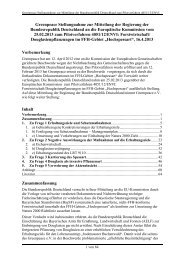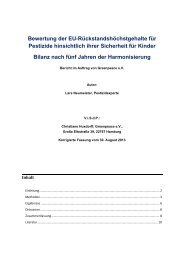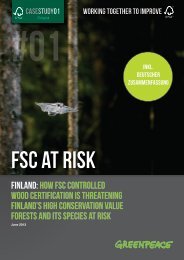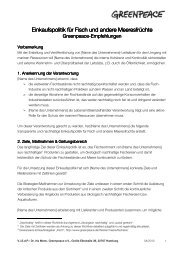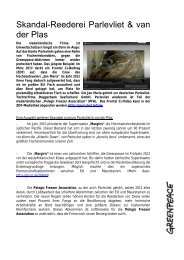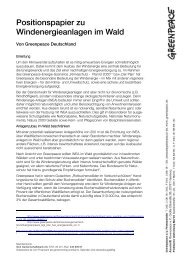Untitled - Greenpeace
Untitled - Greenpeace
Untitled - Greenpeace
You also want an ePaper? Increase the reach of your titles
YUMPU automatically turns print PDFs into web optimized ePapers that Google loves.
THE LAW WORKS HAND-IN-HAND<br />
WITH SICOBOIS<br />
Sicobois is a Belgian-owned company with<br />
three logging titles in Equateur Province,<br />
covering nearly 400,000 hectares. 329 These<br />
contracts have been signed after the<br />
moratorium. Although Sicobois had logging<br />
titles in Lissala before May 2002, <strong>Greenpeace</strong><br />
has reason to believe that old forest areas<br />
titles were exchanged for new ones. 330<br />
However, in the absence of publicly available<br />
company-specific pre- and post-moratorium<br />
maps, it is impossible to make a fully informed<br />
independent judgement.<br />
A report by a Congolese NGO 331 states that<br />
Sicobois often consults with local communities<br />
regarding authorisation for forestry<br />
prospecting, and it has negotiated and signed a<br />
number of agreements. However, in most<br />
cases these consultations and agreements<br />
have not led to harmonious relations.<br />
One agreement was concluded between<br />
Sicobois and three community groups<br />
(Bolongo-Bosuwa, Monduga and Bobala) on 16<br />
January 2004. 332 The company agreed to<br />
supply the three communities with a quantity<br />
of various tools and materials, and also to build<br />
a dispensary and a school, renovate another<br />
school, and supply benches for these and two<br />
other existing schools.<br />
On 3 October 2005, an ongoing conflict around<br />
forest exploitation between the community of<br />
Bolongo-Bosuwa and Sicobois seriously<br />
escalated, with the company categorically<br />
refusing the community’s request to negotiate<br />
a new agreement to log its forests. According<br />
to an article in La Voix du Paysan newspaper,<br />
the Belgian Ambassador offered to negotiate<br />
but this was rejected by Sicobois. The<br />
community decided to block the roads to the<br />
logging sites and deny the company’s vehicles<br />
entrance to ‘their’ forests. 333<br />
This article goes on to state that Sicobois did<br />
not respond to the community’s invitation to<br />
negotiate a peaceful solution. However, three<br />
officials, including a police officer, left Lisala for<br />
the ‘conflict zone’ the same day. On their<br />
arrival they arrested the chief of the<br />
community and four of his councillors. All of<br />
them were taken to prison and detained for six<br />
days. Another councillor went up to Lisala the<br />
same day to inform the coordinator of a local<br />
CARVING UP THE CONGO 57<br />
NGO about the situation. When he returned<br />
that evening to tell the community what had<br />
become of the arrested men, he came across a<br />
car full of Sicobois workers who were on their<br />
way to remove the blockades to the logging<br />
site. He was forced into the car and that night<br />
they took him all the way back to Lisala to<br />
have him put in prison as well (simply because<br />
he had come back to the community to tell the<br />
people what had happened to their chief and<br />
councillors). The prosecutor who subsequently<br />
examined the case concluded that the chief of<br />
the community should never have been<br />
intimidated in this manner. 334<br />
Nor was this an isolated incident. In the<br />
neighbouring community of Mondunga, a<br />
roadblock was set up by the local population in<br />
order to insist that the logging company<br />
respect its commitments. As a result of this<br />
blockade, the president of the local<br />
community’s committee on forest<br />
management, Professor Wale, was reportedly<br />
arrested in Lisala and spent two weeks in<br />
prison. 335 The evidence suggests that when<br />
faced with protests at its conduct, Sicobois<br />
prefers to leave it to the police to intimidate<br />
communities rather than talk through the<br />
difficulties – perhaps because negotiation<br />
would force the company to admit that it fails<br />
to abide by its local agreements.<br />
Sicobois exports its timber to Europe, Danzer<br />
is a major client of the company. 336



